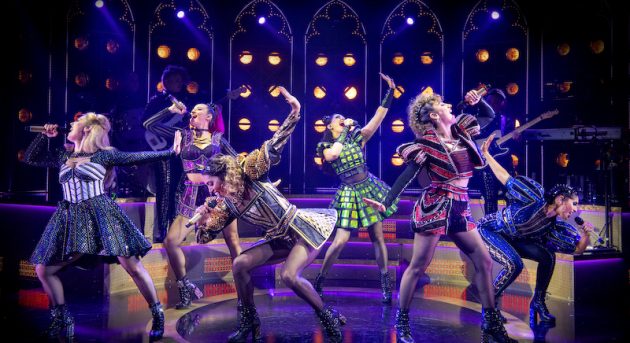SIX the Musical to present Auslan interpreted performance
Accessibility in the world of music theatre still has quite a way to go.
We have previously discussed areas of improvement, but it is always good to see when companies start to implement more inclusive practices. With 1 in 6 Australians affected by hearing loss, Australian Sign Language (Auslan) interpretation is an easy way to adjust our theatre experience to a large quantity of the Australian public.
SIX The Musical are set to present an Auslan interpreted performance on Wednesday March 30th. Auslan interpreters will stand to the side of the stage and translate what the performers are saying into Auslan. A block of seats is reserved for users of this service to ensure a good view of the interpreter and the stage. In regards to Auslan interpretation for SIX, the interpreters work masterfully to convey the fast paced pop music, the wit and humour of the dialogue and the intricate pop culture references woven throughout the performance,
We chat with SIX cast member Chelsea Dawson (Katherine Howard) who is studying her Cert II in Auslan and Auslan interpreter Brendan McQuiggin (Auslan Stage Left) about the importance of integrating Auslan into live performance.

Can you tell me a bit about your background with Auslan?
Chelsea: My journey with Auslan started in high school when I began the Duke of Edinburgh Award program. There are different levels within the program and to complete them you must do a certain number of hours in a ‘skill’, a ‘physical activity’ and ‘volunteering’. At my school the outdoor education teacher knew Auslan and offered to share his knowledge as a ‘skill ‘and it became a weekly lunchtime meeting immersing ourselves in the world of Auslan. I fell in love with the language but by the end of high school I had so much focus on being prepared for University auditions that I had to drop the lunchtime meetings. It wasn’t until my third year of my Bachelor of Musical Theatre that I revisited my love for Auslan with creating a piece for Elegies: A Song Cycle with our director Jason Langley. After that show was when I decided I wanted to start my training in becoming an Auslan Interpreter.
Brendan: I was first accredited as an Auslan interpreter in 2008 after studying the language from 2006. I was first exposed to the deaf community after having met a neighbour who was deaf and used Auslan as her primary method of communicating. As a result, I made it a goal to pursue learning to sign which landed me in the interpreting space.
Why did you decide to undergo your certificate 2 in Auslan?
Chelsea: I have commenced my Auslan Certificate II to hopefully continue my training in becoming an Auslan Interpreter. The reason why I fell in love with musical theatre is because I was able to use not only my spoken voice but music and movement to communicate stories and when I realised that learning Auslan could be a way for me to share stories with everyone and anyone, hearing or deaf, I knew I needed to start this journey. It is my dream to one day, be in a musical, sharing a character’s story through music and Auslan.
What are some of the challenges that arise when creating interpreted performances?
Brendan: Interpreted theatre is multifaceted. It requires learning a script, a character’s motives and intention behind what they say, adopting their persona and personality when interpreting to ensure that the audience is receiving the same detail of information as someone who can hear the performance. Additionally, there is the added layer of adding beat and rhythm when interpreting music. Other challenges include the language that is used. Not everything in English interprets accurately or has an equivalence, and with humour including jokes or idioms, these sometimes require more time to express and reach equivalence, trying to fit it all in can be a challenge sometimes.
What insights into the process of Auslan interpretation have you gained while undertaking your studies?
Chelsea: I completed an introductory course last year and I am only a month into my training but so far I have learnt so much about the language and have had the privilege to watch interpreting happen in class. How tone in the voice is represented in Auslan is rich with facial expressions, rhythm and energy. There is a similarity I find with interpreting and acting that for both jobs you must be invested in the information that is being given to you to respond with the same amount of detail. They are both about listening and communicating and I think it is why the language has resonated with me.
What do you think is important for audiences to understand about Auslan interpretation?
Chelsea: I think it is important for audiences to be respectful of the sight lines that are created between the performers, interpreters and d/Deaf community who come to attend the show. Any obstruction in their view is like putting noise cancelling headphones on a hearing person. Being respectful and considerate of that is really important as most of the time there are only very few shows, if not one, that the d/Deaf community can attend with an interpreter. On behalf of the cast of SIX the Musical, we are so excited to share this show with the d/Deaf community and we can’t wait to perform it for you.
Brendan: Deaf people love the arts just as much as those who can hear and therefore, to ensure that those who are Deaf can access the arts, all aspects should have interpreting. Music and musical theatre is no exception. Many performances have movies, stories that are told over time, or are about significant moments in history, and many Deaf people have knowledge of these shows and the storylines that go with them. This means, that Deaf people can enjoy these shows just as much as those who can hear them and without interpreted performances, they miss the opportunities that others who can hear have access to every day.
The Auslan interpreted performance of SIX is on Wednesday March 3oth.
For tickets and more information, visit the Sydney Opera House website.




